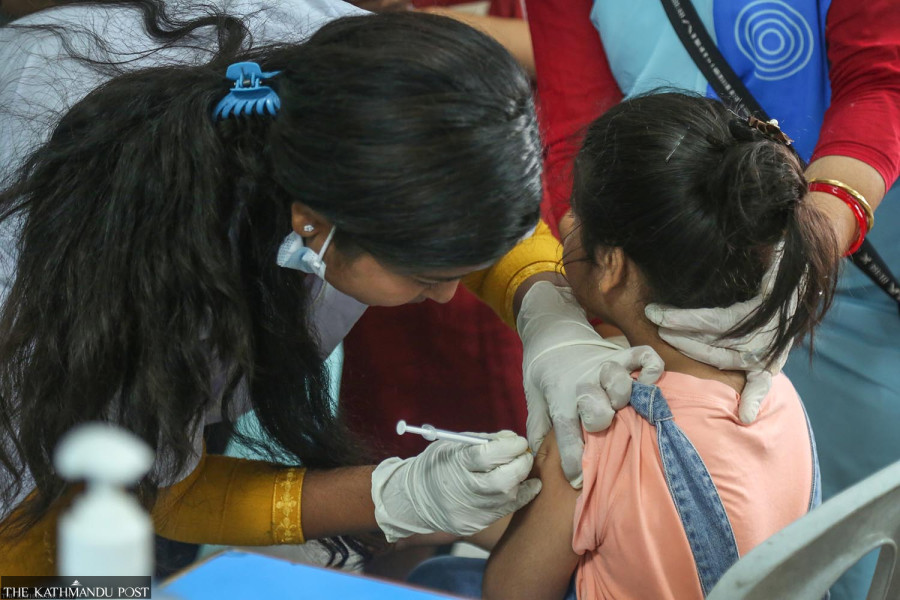Health
Covid vaccination for 5-11 year olds affected by syringe shortage
Children of the age group in 27 districts were to be provided their second doses from Monday but some districts including Kathmandu failed to do so due to the shortage.
Arjun Poudel
The administration of the second dose of the Covid-19 vaccine to children between five and 11 years has come to a halt in several districts, including in the districts of Kathmandu Valley, after the Ministry of Health and Population could not supply syringes on time.
This is the second time the Covid-19 vaccination programme has been halted due to a lack of syringes in Nepal.
“We do not have the syringes to administer the second dose of the vaccine,” Basanta Adhikari, the chief of the Health Office, Kathmandu, told the Post. “We aim to resume vaccination from next Sunday if the Department of Health Services supplies us with the required number of syringes.”
Last December, immunisation of children between 12 and 17 years with the Pfizer-BioNTech vaccine was halted because the Health Ministry ran out of syringes.
The first phase of the immunisation campaign against Covid-19 for children between five and 11 years was launched in 27 districts on June 23 after Nepal received around 2.2 million paediatric doses of the Pfizer-BioNTech vaccine.
The campaign was launched in Jhapa, Ilam, Morang, Sunsari, Saptari, Dhanusha, Parsa, Siraha, Mahottari, Kathmandu, Lalitpur, Bhaktapur, Chitwan, Kavrepalanchok, Sindhuli, Makawanpur, Kaski, Nawalparasi West and Nawalparasi East.
Other districts where the vaccination drive was launched in the first phase are
Rupandehi, Banke, Dang, Bardiya, Surkhet, Kailali, Kanchanpur and Dadeldhura.
Around 2.2 million children of the said age group were inoculated in the week-long campaign.
Children of the said age group who were inoculated with the first paediatric doses of the Pfizer-BioNTech vaccine in June were supposed to receive the second dose of the vaccine from Monday.
Meanwhile, thousands of 5-11 year olds have not even received the first dose of the vaccine due to the shortage of syringes, according to the Health Office, Kathmandu.
According to Adhikari, over 60,000 children of the age group have not yet received the first dose of the vaccine due to syringe shortage. “We will administer vaccine doses to children who have missed the first dose and to those waiting for their second doses,” Adhikari said.
Two types of syringes are needed to administer a paediatric dose of the Pfizer-BioNtech vaccine—a 0.2ml syringe for vaccine administration and a 2ml syringe for vaccine mix-up with diluent.
The Pfizer-BioNTech vaccine for adults is administered through a 0.3 ml syringe, health officials say, while for other vaccines, a 0.5ml auto-disable syringe is used.
Officials at the Health Ministry admitted that there has been syringe shortage in some districts. The delay in the supply of syringes from the COVAX facility, the United Nations-backed international vaccine-sharing scheme, which supplied the vaccine doses, has led to a shortage of syringes for Covid-19 vaccines in Nepal, they say.
“Also last week, we drew the attention of the officials of the UN health agency about the delay in syringe supply from the COVAX facility,” said Sagar Dahal, chief of the National Immunisation Programme. “I haven’t received information about the disruption in vaccination of children between 12 and 17 years due to syringe shortage but that might be the case in some districts.”
Officials at the Logistic Management Section under the Department of Health Services said that it has been working to send the syringes from districts with surplus stock to shortage districts.
“We are working to reverse supply from the districts with surplus syringes,” said Dr Surendra Chaurasia, chief of the Section.
Officials said that the Health Ministry had only around 4.5 million syringes of 0.2ml capacity in stock. Some fresh syringes may have gone to waste without use.
“Due to managerial issues, some districts might have ended up with surplus syringes while some are facing shortages,” said Dahal, chief of the National Immunisation Programme.
Nepal started administering the Covid-19 vaccine to children between five and 11 years after the COVAX facility supplied paediatric doses of the Pfizer-BioNTech vaccine.
The facility has so far supplied 4,610,400 paediatric doses of the vaccine out of the 8.4 million doses it has committed to Nepal.
Nepal has so far received 58,891,970 doses of Covid vaccines of various brands—AstraZeneca, Vero Cell, Moderna, Janssen, Sinovac-CoronaVac and Pfizer-BioNtech—including those of paediatric doses.
Experts say this is not the first time managerial weakness in the health sector has been exposed.
“Problems like the syringe crisis should not be arising again and again, as it is a planned programme,” Bhogendra Dotel, former chief of the Logistic Management Section, said. “Had the authorities taken the issue seriously, assessed the need and completed the procurement process on time, crucial programmes like vaccination would not have been affected.”




 11.84°C Kathmandu
11.84°C Kathmandu















